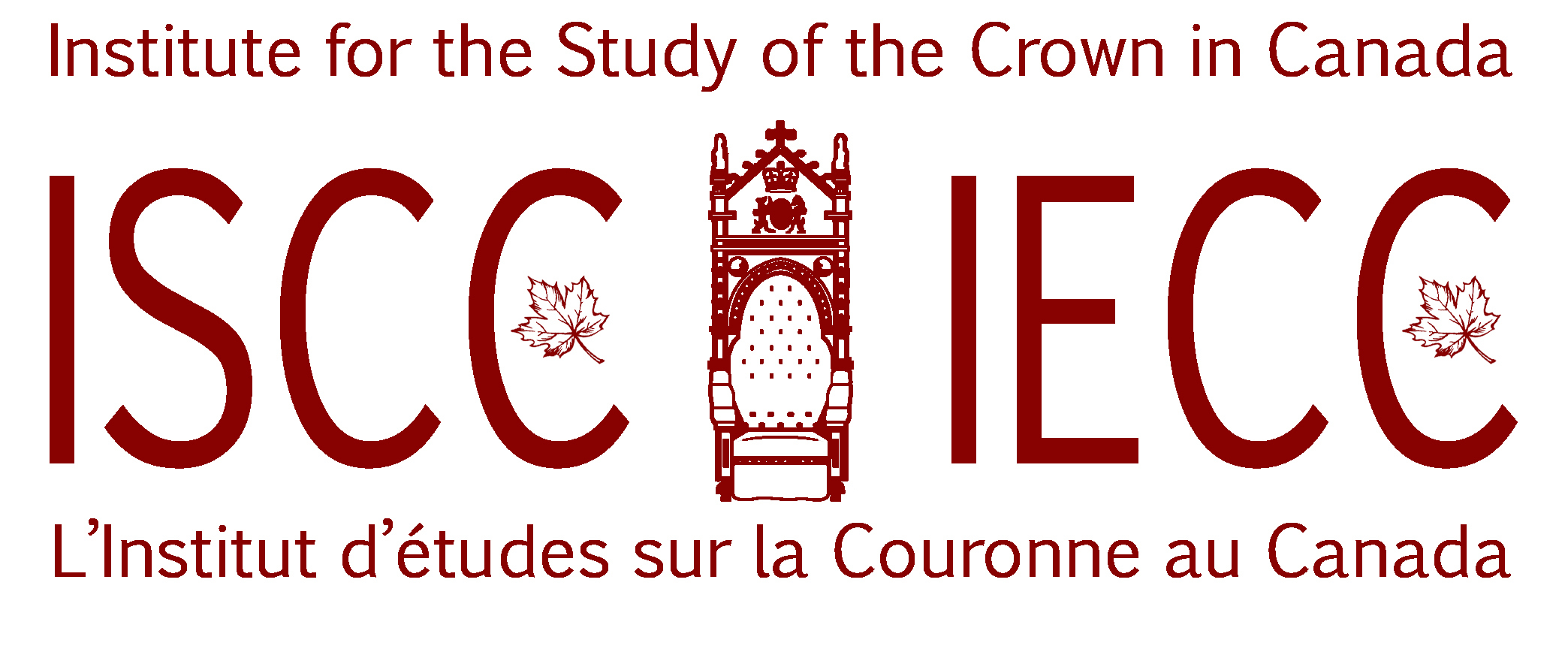
Comments are welcome: president@iscc-iecc.ca.
If this newsletter has been forwarded to you and you wish to receive these updates automatically, sign up on our website.
In this issue
President’s message
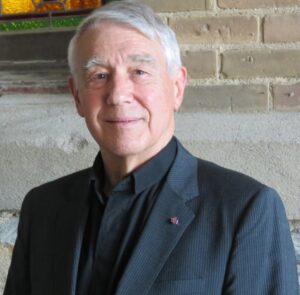
I am pleased to provide an update on the activities of the Institute for the Study of the Crown in Canada.
In June 2019, we held our fourth conference on the Crown, for the first time at our “home” of Massey College in the University of Toronto.
The conference attracted speakers and delegates from across Canada and from Australia, New Zealand, and the United Kingdom, to discuss “The Crown in a Time of Transition.” A poignant topic was the relationship between Indigenous peoples and the Crown, not only in Canada but in New Zealand as well. The conference coincided with the annual gathering of Canada’s viceregal representatives and we were privileged to welcome nine Lieutenant Governors and Territorial Commissioners to our events.
An outcome of the conference was a book, published for us by Dundurn Press in early 2020, Royal Progress: Canada’s Monarchy in the Age of Disruption (click the link for the table of contents), with six of the nine chapters based on conference presentations. We had just lined up a book launch for March in Ottawa with several of our authors taking part when… COVID-19 struck! That, and a similar event in Regina with contributor National Chief Perry Bellegarde, had to be cancelled. However, thanks to the generosity of our donors, we were able to send complimentary copies of Royal Progress to all who had registered for the 2019 conference, as well as to academics and practitioners in the four countries involved. It also bears mentioning that several essays based on conference presentations were published in a special issue of the Journal of Parliamentary and Political Law (June 2020).
The year 2020 turned out to be the one in which the Institute acquired a media profile. The travails of the Governor General and Rideau Hall were front-page news and we were called on frequently by television, radio and print media to provide informed opinion on the situation. This accelerated in January 2021 when Julie Payette resigned as Governor General. Institute board members took the initiative to publish opinion pieces on matters related to the Crown in The Globe and Mail, the Toronto Star, the Ottawa Citizen, Maclean’s, Policy Options, and The Dorchester Review. A regularly updated list of these with links is posted on the Institute website.
The Institute made some major changes internally. Our governance was restructured to provide for a five-person executive committee to direct our activities and an advisory board of eight members to support them. We announced the appointment of the first eight Fellows of the Institute. The website itself, completely renewed by our secretary, John Gross, has drawn many favourable comments and a number of inquiries from the media and others. We commend it to you: https://iscc-iecc.ca.
The events of the past year have underscored the dearth of civic literacy in our country with respect to institutions of governance. There is an evident need for informed comment and analysis on the role of the Crown in Canada. And that, of course, is the purpose of our Institute.
Michael Jackson
President, Institute for the Study of the Crown in Canada
Essay prize
The Honourable Margaret McCain Essay Prize
Cash prize of $1,000
Deadline for submission: 31 May 2021
With the encouragement and generous support of our Patron, the Honourable Margaret McCain, CC, ONB, the Institute for the Study of the Crown in Canada announces a prize for the best undergraduate essay on the topic of the Crown in Canada, broadly defined. The topic embraces any aspect of the Crown in Canada, including but not limited to the monarch and the Canadian federal and provincial viceregal representatives. Submissions are welcomed from any academic discipline.
Essays for consideration should be submitted by university faculty on the student’s behalf. Any undergraduate student is eligible, up to and including the year of graduation. Full- and part-time students are eligible.
The student’s full name and university affiliation should be listed on a cover page, along with the name and department of the submitting faculty member. This cover page will be removed during the judging process, and no identifying details should appear in the essay itself.
Essays submitted should be in the range of 2,500 to 5,000 words, plus citations. Full citations and bibliography should be included (any recognized style). Submissions should be in Word, double-spaced, in 12-point font with standard margins.
Submissions will be judged by a committee of the Institute for the Study of the Crown in Canada. Submissions should be sent to president@iscc-iecc.ca. The winning essay will be posted on the Institute’s website: https://iscc-iecc.ca.
The Honourable Margaret McCain, CC, ONB
In 1994, Margaret Norrie McCain was appointed Lieutenant Governor of the Province of New Brunswick—the first female to hold this position. She served in that role until 1997, when she moved to Toronto. Mrs. McCain has been active in organizations that promote education, music and the arts at the provincial and national levels. She served as chancellor of Mount Allison University from 1986 to 1994 and was a member of the board of the National Ballet School for eighteen years, serving as board chair from 1998 to 2000. She is currently chair of the Margaret & Wallace McCain Family Foundation. In 2019 Mrs. McCain became patron of the Institute for the Study of the Crown in Canada. She is a Companion of the Order of Canada and a Member of the Order of New Brunswick.
Recent publications
We draw your attention to several newly published books.
The Role of Monarchy in Modern Democracy
European Monarchies Compared
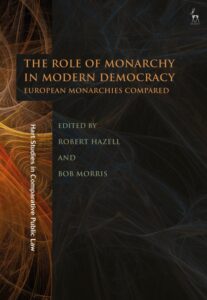
Edited by Robert Hazell and Bob Morris
How much power does a monarch really have? How much autonomy do they enjoy? Who regulates the size of the royal family, their finances, the rules of succession? These are some of the questions considered in this edited collection on the monarchies of Europe.
The book is written by experts from Belgium, Denmark, Luxembourg, the Netherlands, Norway, Spain, Sweden and the UK. It considers the constitutional and political role of monarchy, its powers and functions, how it is defined and regulated, the laws of succession and royal finances, relations with the media, the popularity of the monarchy and why it endures.
No new political theory on this topic has been developed since Bagehot wrote about the monarchy in The English Constitution (1867). The same is true of the other European monarchies. 150 years on, with their formal powers greatly reduced, how has this ancient, hereditary institution managed to survive and what is a modern monarch’s role? What theory can be derived about the role of monarchy in advanced democracies, and what lessons can the different European monarchies learn from each other?
The public look to the monarchy to represent continuity, stability and tradition, but also want it to be modern, to reflect modern values and be a focus for national identity. The whole institution is shot through with contradictions, myths and misunderstandings. This book should lead to a more realistic debate about our expectations of the monarchy, its role and its future. The contributors are leading experts from all over Europe: Rudy Andeweg, Ian Bradley, Paul Bovend’Eert, Axel Calissendorff, Frank Cranmer, Robert Hazell, Olivia Hepsworth, Luc Heuschling, Helle Krunke, Bob Morris, Roger Mortimore, Lennart Nilsson, Philip Murphy, Quentin Pironnet, Bart van Poelgeest, Frank Prochaska, Charles Powell, Jean Seaton, Eivind Smith.
A comment on Anne Twomey’s The Veiled Sceptre
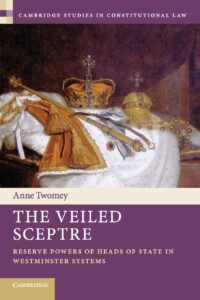
Review by D. Michael Jackson
In 2018, Anne Twomey (University of Sydney, Australia), one of the Institute’s academic advisors and a speaker at our 2016 and 2019 conferences, published through Cambridge University Press The Veiled Sceptre: Reserve Powers of Heads of State in Westminster Systems.
This is without a doubt the definitive work on the complex question of the reserve or prerogative powers exercised by the monarch or the viceregal representatives, such as royal assent, prorogation and dissolution, appointment and dismissal. It encompasses not just the larger Commonwealth realms—the United Kingdom, Canada, Australia and New Zealand—but all present and some former realms, too. The Veiled Sceptre
demonstrates an amazing breadth and depth of scholarship. It is also well-written and accessible – no small achievement. Dr. Twomey’s assessments of the 1926 Canadian “King-Byng Affair,” the 1975 Kerr-Whitlam episode in Australia, and the 2008 Canadian prorogation are among the best I have seen—fair, clear, and balanced.
With respect to Canada, the bibliography is extraordinarily extensive. I was pleased to see how often books sponsored by the Institute for the Study of the Crown in Canada or written by people involved in the Institute are referred to. Andrew Heard’s Canadian Constitutional Conventions is deservedly the champion. Barbara Messamore’s Canada’s Governors General, 1847-1878 is mentioned a lot. There are also references to my own The Crown and Canadian Federalism—gratifying, if rather intimidating, for a book with limited use of primary sources.
Being an habitual reference-checker, I appreciated the use of footnotes rather than endnotes! I also liked Dr. Twomey’s practice of repeating information on specific incidents or cases under different categories of the reserve powers; this makes The Veiled Sceptre an invaluable reference source for researchers and practitioners. I commend it to all those with a serious interest in the constitutional monarchy we share with the other Commonwealth Realms.
Government House Halifax
A Place of History and Gathering
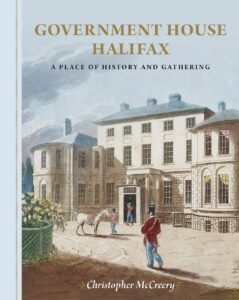
By Christopher McCreery
Government House Halifax is the home of the Sovereign’s representative in the Province of Nova Scotia and the ceremonial home of all Nova Scotians. It has also served as a home away from home for members of the Royal Family over its two-century history.
Written by Institute board member Christopher McCreery, Government House Halifax: A Place of History and Gathering tells the story of this historic building. Beginning with its construction in 1800 and continuing through its extensive renovations in 2009, this sumptuous book tells the story of the building’s royal residents, the household staff, and the momentous—and occasionally amusing—events which have transpired within its walls. Christopher McCreery expertly guides readers through the building, including the state rooms and its hidden secrets, and introduces readers to important works of art held at Government House as part of the Crown Collection. Dr. McCreery’s text is amply illustrated by an extraordinary collection of images, including historic drawings and paintings along with modern photographs.
The Royal Prerogative and Constitutional Law
A Search for the Quintessence of Executive Power
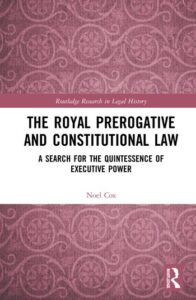
By Noel Cox
New Zealand scholar Noel Cox, author of A Constitutional History of the New Zealand Monarchy (2008), spoke at the Institute’s first conference on the Crown in Ottawa in 2010. This new book, just published by Routledge, examines the royal prerogative in terms of its theory, history and application today.
The work explores the development of the royal prerogative through the evolution of imperial government, and more recent structural changes in the United Kingdom and elsewhere in the Commonwealth. While examining specific prerogative powers, the development of justiciability of the prerogative, and the exercise of the prerogative, it lays bare the heart of constitutionality in the Westminster system of government. There is said to be a black hole of unaccountable authority at the heart of the constitution and it is this which this book examines. The focus is upon the constitutional development of the United Kingdom and the old dominions of Canada, Australia and New Zealand. This approach is comparative and historical, using specific case studies of such events as the dissolution of Parliament and the appointment and dismissal of Prime Ministers.
The book will be of interest to academics and researchers working in the areas of Constitutional Law and Politics. It has a complete and detailed bibliography, with considerable Canadian content.
Institute Fellows
In August 20202, the Institute was pleased to announce the appointment of its first Fellows, listed below. For complete details, view the media release.
The College has a two-fold purpose:
- To recognize distinguished persons who have made major contributions to the study of the Crown.
- To associate them with the Institute’s mission of educating Canadians on the Crown.
Inaugural Fellows
John Fraser, CM, Master Emeritus of Massey College and Founding President, Institute for the Study of the Crown in Canada
Dr. Andrew Heard, Professor of Political Science, Simon Fraser University
Dr. D. Michael Jackson, CVO, SOM, CD, President, Institute for the Study of the Crown in Canada
The Right Hon. David Johnston, PC, CC, CMM, COM, CD, former Governor General of Canada
The Hon. Serge Joyal, PC, OC, OQ, FRSC, former Senator from Québec
Dr. Barbara J. Messamore, FRHistS, Professor of History, University of the Fraser Valley
Dr. Peter H. Russell, OC, FRSC, University Professor Emeritus at the University of Toronto
Dr. David E. Smith, OC, SOM, FRSC, Adjunct Professor, Politics and Public Administration, at Ryerson Universit
Fellows may use the post-nominal letters FSCC.
Institute members recognized
Two executive members of the Institute have been recognized for their achievements.
John Fraser

Our Founding President received the prestigious Michener-Baxter Special Award from the Michener Awards Foundation for long-term achievement in public service journalism.
Nathan Tidridge

Our 1st Vice-President received the Governor General’s History Award for excellence in teaching history.
About the Institute
Check the website of the Institute for the Study of the Crown in Canada at https://iscc-iecc.ca for news of the Institute and informed comment by leading authorities on the Crown.
Executive committee
| President | D. Michael Jackson, CVO, SOM, CD, FSCC | Regina |
| Founding President | John Fraser, CM, FSCC | Toronto |
| 1st Vice-President | Nathan Tidridge, MSM | Waterdown, ON |
| 2nd Vice-President | Barbara J. Messamore, FRHistS, FSCC | Vancouver |
| Secretary | John Gross | Toronto |
Advisory Board Members
| Signa A. Daum Shanks | Toronto |
| Mary Dawson, CM, QC | Ottawa |
| J. William Galbraith | Ottawa |
| Carolyn Harris | Toronto |
| The Honourable Serge Joyal, PC, OC, OQ, FRSC, FSCC | Montréal |
| Christopher McCreery, MVO | Halifax |
| The Honourable David Onley, CM, OOnt | Toronto |
| Michael Valpy | Toronto |